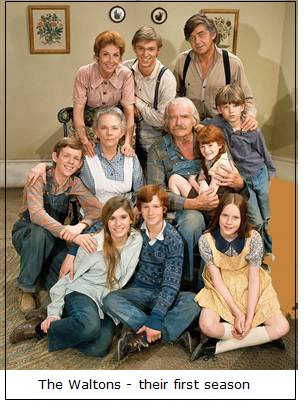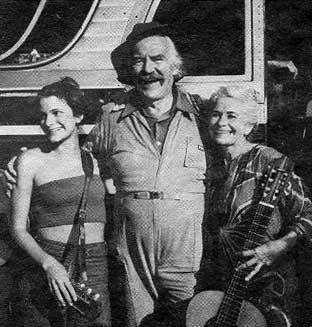
But The Waltons – the show and the cast, are used to making history. A superior production on every level, the program was real. Set in the Depression era of the late 1930s, it was blessed with premium talent, behind and in front of the camera in every aspect of production, from Emmy-winning performances delivered by Thomas, Learned, Waite, Geer and Corby, to the also-award-winning tender but crisp writing and directing. As Thomas recently said during a cast reunion on NBC’s Today show, critics who coined the series too saccharine never invested a dime in actually watching it.
“It was funny,” Eric Scott begins to explain, “because when we’d read certain reviews that said we were too schmaltzy or a little too sweet, we just never thought that was the case. I mean, there’d be scenes where John Walton (the father played by Waite) would lose his patience, and yell at the kids whether it was right or wrong. So, I disagreed with the critics back then.”
As well he should have. Truth-be-told, the Walton characters did indeed interact on very legitimate terms. They laughed, cried and became angry with one another, as in any actual family. But at their core was the love that held them together with a happy steady strength in poor tough times.
With so solid a premise, it would be surprising for any associated actor, much less an alignment of young actors, to not walk away from such a creative environment without an indestructible moral structure.
%20Eric%20during%20the%20core%20Ben%20Walton%20years.jpg) But Eric Scott credits his strong sense of priorities to his parents, and not the Waltons scripts or his experience in working on the series. His father, Sumner Magat, who succumbed to a heart attack in 1976, was a hard-working hairstylist in Van Nuys, California; and his mother, Judy Magat, became his manager. Both were his true guiding lights.
But Eric Scott credits his strong sense of priorities to his parents, and not the Waltons scripts or his experience in working on the series. His father, Sumner Magat, who succumbed to a heart attack in 1976, was a hard-working hairstylist in Van Nuys, California; and his mother, Judy Magat, became his manager. Both were his true guiding lights.
“I did a lot of shows before The Waltons,” he says, “where I was the only child on the set, or when there was maybe just one other child there. I had never worked with a group of kids like on The Brady Bunch (ABC, 1969-1974) or The Partridge Family (ABC, 1970-74). I didn’t know what it was like to be with other parents and other kids.”
However, from the minute he stepped on the set of The Waltons, his mother committed to his career. As he recalls, she approached him and said, “I will quit my job and be there for you for as long as you are on the show.”
Eric says Judy Magat received “the going rate” for someone who functioned as she did on the set. “We worked out an arrangement. And she kept me in line, which was not an easy thing to do with a young12-13-year-old boy. But she did an incredible job.”
At the end of each Waltons day’s work, in which his gentle Ben character was instructed by parents John and Olivia to do any assortment of chores, Eric would return to the Scott homestead where his real mother and father would instruct him to do the same. “I still had to go out and clean up after the dog, and to do all the things that were necessary in a regular family setting,” he says.
Into this mix, his mother encouraged him to get a formal education. “She didn’t feel that ‘acting’ was a career that I should be focusing on in my studies,” he says. “That didn’t mean that I shouldn’t try and be a good actor,” but while attending school on the Warner’s lot (where The Waltonsfilmed), he worked diligently on his science and math courses, “and anything else that I was good at that would encourage me to go off to college.”
Consequently, he attended Pierce College in the San Fernando Valley, from which he graduated in 1979 with a Business degree, again, all due to his parents’ proper and general balance of priorities, and specifically, the on-set support that he received from his mother. “She definitely kept it real,” he says. “And she watched out for the other kids, too. She became the set-mom for a lot of them because there were those who did not have that kind of consistency. Maybe their moms came down a little bit but they had babysitters. And that’s part of it too.”
Suffice it to say, Eric and his mother were a stabilizing force for the other young actors on The Waltons. “I had worked for four or five years beforehand,” he intones, “so I understood that being on a show was serious business. There’s time to play and then there’s time not to play. So there was definitely a grounding that happened while being on the set that I felt that, yes – if I could influence others, I would.”
An acting vet by the time he appeared in The Homecoming, Eric had performed in TV classics like Bewitched, in commercials such as those famous Hot Wheels spots for Mattel – which started circa 1967, and for which Keiyo Glenn served as the casting director. “That was one of my first jobs,” he explains, “and Glenn was casting a significant number of commercials at that time.”
But there was a snag in the process when it came to casting the young Master Scott in his first actual speaking role on film.
“Well, Eric,” Glenn would tell him, “you need to be in the union.”
To which he’d reply, forthrightly, “I can’t be in the union until I get a job. So why don’t you give me a job and then I’ll be in the union and we won’t have this conversation again.”
“And she got me the job,” Eric recalls today with a sly smile.
Subsequently, Glenn began casting Eric in a lot of jobs. “She saw that look I had and needed to cast it,” specifically for the Hot Wheels Mattel commercials, of which he did several. “In fact,” he explains, “I was the first boy that was actually cast in a doll commercial for Mattel.”
He also worked as a model in print ads for companies like Bank of America – which was his first job – at a mere seven-years-old. “And from there,” he says, “I started doing a little bit more of the episodic work in television.”
Some of those TV appearances included guest-spots on The Interns(CBS, 1970-71), Medical Center (CBS, 1969-76), and The Young Rebels (NBC, 1970-71), amongst several other shows in the 1970s.
It all began when after his parents were frequently approached by friends and those in the industry who’d say, “He should be on TV. He’s got the look.”
“I heard that more than a few times,” he says, “and it intrigued me, the idea of doing something like that.”
“Basically,” he goes on to reveal, “I grew up pretty much without anything. My dad struggled to make the house payments. My mom worked to keep us fed, and it wasn’t easy. So I felt that acting would provide a good way to pay for college.”
“I’d like to try that,” he said of his theatrical aspiration.
The Scott (Magat) family then met with a few agents all of whom essentially responded in the same way: “Oh, Eric – you’d be great. Let’s get some pictures of you,” which the Scotts proceeded to do.
However, after a few months of “getting absolutely nowhere with them,” Eric explains, “we’d contact them, and they’d say, ‘Eric who?’”
But the lines of communication would soon change for the better as when, one day, a client of his father’s hair salon noticed Eric’s photo on the mirror. This particular client, whose name Eric does not recall, happened to live next door to theatrical agent Helen Bruce who owned Junior Artists Unlimited. The client asked for a copy of Eric’s picture, which he promised to slide under Bruce’s door at home.
Shortly thereafter, Bruce called to meet with Eric, who signed with Junior Artists on the spot, and was immediately sent on auditions. “She was a wonderful agent,” Eric says of Bruce. “Whenever I received a call to meet a casting director, she would go with me. She was very devoted to my career, and definitely played an important role in jump-starting it.”
If Helen Bruce jump-started Eric’s career, then The Waltons ignited it.
With participation in that particularly famous TV family, he sensed something special was in creation, although no one envisioned the series would become so legendary in the vast landscape of TV history. “We all knew what we were making was quality,” he says. “And I always felt that the production values of our show were very strong. We knew when we were making it that each episode was going to stand on its own. But we had no idea that it would be as timeless as it’s become today.”
